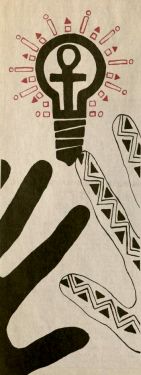Spotlight on African American LGBTQ+ Periodicals
February 11, 2020
 In late 1969, almost six months after the Stonewall Riots occurred in Greenwich Village, Manhattan, the Gay Activists Alliance was founded in New York City. The group included the Black Lesbian Caucus, which later renamed itself Salsa Soul Sisters, Third World Wimmin Inc., credited as the oldest Black lesbian organization in the United States and known today as African Ancestral Lesbians United for Societal Change. In 1974 the Salsa Soul Sisters were a collective of Black and Latina lesbians who offered alternatives to the gay and lesbian social scene which historically discriminated against lesbians of color. The collective published several quarterly periodicals, including Azalea: A Magazine by Third World Lesbians, which ran from 1977 to 1983. Special Collections and Archives houses Volume 5, Number 2—one of the final issues of Azalea, which features unedited articles by visionary womanists such as Ruth Farmer, Becky Birtha, and Anita Cornwell, among others. Azalea’s editorial policy was “...one of NO EDITING: That is, not directing or changing a woman’s way or method of saying what she needs to say...as a true way of respecting each woman’s personal vision—and her right to voice it.”
In late 1969, almost six months after the Stonewall Riots occurred in Greenwich Village, Manhattan, the Gay Activists Alliance was founded in New York City. The group included the Black Lesbian Caucus, which later renamed itself Salsa Soul Sisters, Third World Wimmin Inc., credited as the oldest Black lesbian organization in the United States and known today as African Ancestral Lesbians United for Societal Change. In 1974 the Salsa Soul Sisters were a collective of Black and Latina lesbians who offered alternatives to the gay and lesbian social scene which historically discriminated against lesbians of color. The collective published several quarterly periodicals, including Azalea: A Magazine by Third World Lesbians, which ran from 1977 to 1983. Special Collections and Archives houses Volume 5, Number 2—one of the final issues of Azalea, which features unedited articles by visionary womanists such as Ruth Farmer, Becky Birtha, and Anita Cornwell, among others. Azalea’s editorial policy was “...one of NO EDITING: That is, not directing or changing a woman’s way or method of saying what she needs to say...as a true way of respecting each woman’s personal vision—and her right to voice it.”
In addition to Azalea, Special Collections and Archives houses other LGBTQ+ periodicals published by and for people of color, including Black Lace and BLK. Both magazines were products of BLK Publishing Company, Inc., founded by Alan Bell, an African-American graphic designer. Black Lace focused specifically on erotic literature for Black lesbians and should not be confused with the British erotica series by the same name geared toward heterosexual female readers published by Virgin Books.
Unlike Black Lace and Azalea, BLK, which ran from 1988 to 1994, focused on bringing news stories of interest to African-American LGBTQ+ readers. BLK’s coverage originally centered on the LGBTQ+ scene of Los Angeles and eventually widened to include national and international issues, including the AIDS crisis happening worldwide. The magazine featured interviews with prominent Black LGBTQ+ activists, including poet Audre Lorde, filmmaker Marlon Riggs, and psychologist Dr. Marjorie Hill, among others, and provided a significant hard-news alternative to the entertainment-focused Black LGBTQ+ publications common at the time. These periodicals are available for use by visiting Special Collections and Archives on the second floor of the library.
Image Gallery
Post tagged as: special collections, publications, los angeles, international
Read more Peek in the Stacks blog entries










